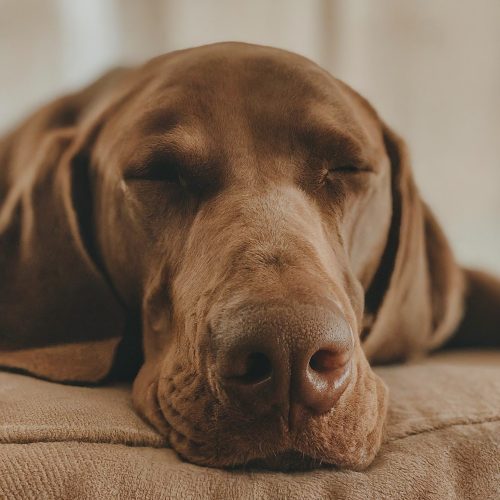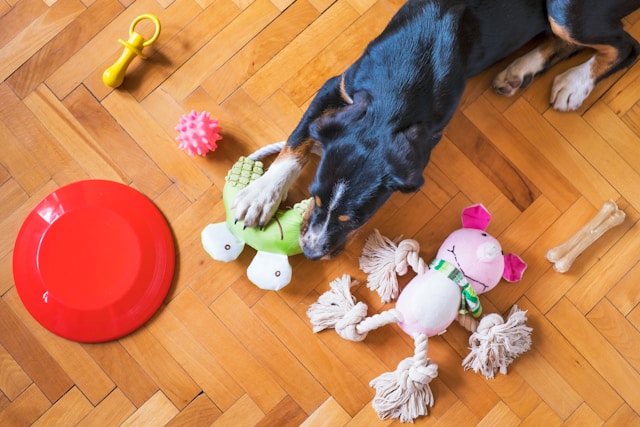
If you find your dog often sleeping during the day, don’t worry – while it’s normal for dogs to sleep at night, many also spend much of the day sleeping.
Most dogs will sleep about 10 to 14 hours in a 24-hour period, but some may sleep up to 20 hours. If excessive sleep has become an issue with your pup, it may be time to investigate.
Changes in sleep patterns can be a result of aging or illness, so you should keep an eye on your dog’s sleep cycle. Here’s how to encourage activity in your dog to keep them awake during the day, along with knowing when to seek help.
Why Does my Dog Sleep So Much
Studies suggest that many dogs sleep an average of at least 11 hours in a 24-hour cycle. Additionally, they have many rest periods, with the smallest part of the day dedicated to activity.
Most dogs will sleep more when they are relaxed and there is not much motivation for them to be active. Since they don’t have smartphones, jobs, or homework, sleeping is a way to pass the day, especially if they are home alone and bored.
Many dogs end up spending about 12 to 14 hours of their days and nights sleeping, but they may sleep more. The amount of sleep your dog gets will depend on various factors:
Very young puppies and older dogs are likely to spend more time sleeping.
Overweight and sick dogs may also sleep more than healthy dogs.
Certain breeds are predisposed to sleeping more (ask someone who has had a slow-moving basset hound versus a high-energy border collie).
Of course, hours and hours of sleep can also be a sign of a health problem. Many diseases and age-related issues can come with a change in sleep patterns.
If you suspect your pet is sick, call your veterinarian immediately. For health-related questions, always consult your veterinarian as they have examined your pet, know the pet’s health history, and can make the best recommendations for your pet.
How to Make Your Dog's Day More Exciting
Since most dogs don’t go to work or school, it’s common for them to get bored if they’re alone for long periods during the day.
Combine a long lonely day with the hours your human spends sleeping, and that’s a lot of time for your dog to spend sleeping every day! If it seems like your dog is spending the days sleeping, consider what else they have to do with their time.
Enrichment
The best way to help your dog stay awake and active during the day is to provide plenty of interesting toys, games, and activities. For example, puzzle toys can be a great way to keep your dog busy and active during the day.
You can also hide kibble or treats inside a towel or an egg carton (as long as your dog isn’t the type to eat towels). Check on your dog using a dog camera to see if they’re engaging with the puzzle toys or ignoring them.
Exercise
You can also make your dog’s day more exciting with mid-day walks and longer periods of exercise in the morning and evening. Some dogs may also enjoy a doggie daycare environment, where they can play with other dogs all day.
If you notice your dog is still sleeping even when there are exciting things to do, or if your dog is no longer engaging in activities they used to enjoy, it could mean something else is going on. Talk to your veterinarian for advice on next steps.

When to Seek Help
It’s quite common for your dog to spend part of the day sleeping or resting. However, excessive sleeping can be a sign of a health problem in your dog.
There are some signs that indicate your dog may be sleeping too much:
- Changes in sleep patterns
- Sleeping even when there’s “something better to do,” especially if that something used to grab their attention
- Sleep interfering with eating or drinking
- Difficulty waking your dog from sleep
- Limping or reluctance to walk, run, or jump
- Increased or decreased appetite, urination, or defecation
- Vomiting or diarrhea
- Coughing, wheezing, or difficulty breathing
- Increased sleep is associated with other behavioral problems
- Disorientation, confusion, getting “lost” in the house, staring at walls or corners
- Increased aggression or fear
- Restlessness and other signs of anxiety
Some of these signs may have developed slowly over time, especially in older dogs. It’s always important to mention them to your veterinarian, as there may be ways to make your dog more comfortable in their golden years.
Your veterinarian will likely have many questions and may need to perform some tests. Dogs who are sleeping more or reluctant to get up may be suffering from pain or discomfort such as arthritis or more acute injuries, endocrine disorders like hypothyroidism or diabetes, or have other medical conditions related to heart disease, neurological issues, or other conditions.
A comprehensive examination by the veterinarian, which will include a complete physical examination, blood tests, and possibly other tests, can help uncover the cause and make your dog feel better again.
Try to track your dog’s sleep patterns and any other symptoms. Make sure she’s at a healthy weight and has plenty to do during the day to enrich her alone time. If she’s still sleeping an unusual amount, it may be time to see the vet.
Cães e o Sono
Perguntas Frequentes
É normal para alguns cães dormirem até 20 horas por dia, especialmente se forem muito jovens, mais velhos ou simplesmente estiverem aborrecidos. No entanto, se o seu cão estiver a dormir mais do que o habitual de repente, deve ligar para o seu veterinário.
Os cães são animais sociais e geralmente gostam de dormir perto das suas pessoas. Alguns cães gostam de se aninhar na cama, mas outros preferem o seu próprio espaço. Eles muitas vezes ainda querem dormir no mesmo quarto que as suas pessoas.
If you suspect your pet is ill, immediately call your veterinarian. For health-related inquiries, always consult your veterinarian as they have examined your pet, know the pet’s health history, and can make the best recommendations for your pet.
